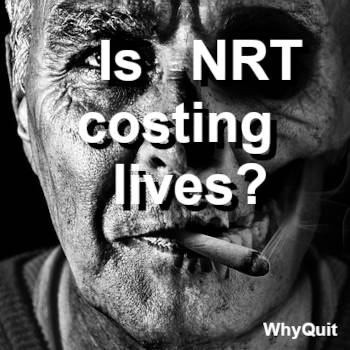
More real-world evidence that NRT doesn't work

Data from a rash of real-world quit smoking studies suggest that nicotine replacement therapy (NRT) is undercutting successful quitting. Shockingly, the newest study begins with the hypothesis that NRT is 25% less effective than quitting unaided.
Entitled "Real-world effectiveness of smoking cessation aids: A population survey in England with 12-month follow-up, 2015-2020" (Jackson 2022), the study is available as an open access PDF offered by the journal Addictive Behaviors.
The Jackson 2022 authors begin by noting that while NRT has demonstrated efficacy in randomized clinical trials, "what is observed under trial conditions does not necessarily generalize" to real-world conditions, that observational data is needed to establish effectiveness.
"This is essential for informing guidance for treatment providers and enabling smokers to make informed decisions," they wrote.
As background, three of the same researchers have twice previously analyzed earlier UK "Smoking Toolkit Study" (STS) survey data evaluating OTC NRT effectiveness (2015 WayBack link).
A 2014 Mayo Clinic Proceedings study (Kotz 2014) was a cross-sectional study scrutinizing 6-month follow-up STS surveys associated with 2006 to 2012 data. The authors found that "Compared with smokers using none of the cessation aids" "use of NRT bought over the counter was associated with a lower odds of abstinence (odds ratio, 0.68; 95% CI, 0.49-0.94)."
A 2019 Addiction study (Jackson 2019) examined 2006 to 2018 STS data and found that in comparing 8,348 unassisted quitters to 5,206 OTC NRT quitters, the unadjusted smoking abstinence rate was 16.8% for unassisted quitters and 11.6% for OTC NRT users (free full-text).
Now, back for a third look, a more prospective 12-month follow-up involving 2015 to 2020 STS data, Jackson 2022 found the unadjusted odds of quitting with OTC NRT were 43% lower than quitting unaided (odds ratio, 0.57, 95% CI, 0.39–0.84), and 40% lower for prescription NRT (odds ratio, 0.60; 95% CI, 0.37–0.98).
Jackson 2022 then heavily adjusts the raw findings for potential confounders before subjecting the adjusted findings to Bayes factor analysis. It does so based upon the hypothesis that NRT would be 75% as effective as quitting unaided (OR=.75), "a point in between the effect sizes observed in studies indicating lower quit rates associated with these aids among smokers motivated to quit."
Running the Jackson 2022 fully adjusted and highest NRT odds ratio finding (Model 3) through a Bayes factor calculator using 2.0 instead of .75 as the "hypothesis under test," the result is a Bayes factor of 0.12, suggesting that those telling smokers that NRT doubles their chances are almost certainly telling a "killing fields" whopper.
By the way, doing the same calculation using "double your chances" and the Jackson 2022 unadjusted findings (Model 1) produces a .07 Bayes factor.
Twenty years ago a 2002 JAMA study concluded that "Since becoming available over the counter, NRT appears no longer effective in increasing long-term successful cessation in California smokers." How many more years before the NHS, FDA, CDC, NCI, SmokeFree.gov, WHO, ACS, Kaiser Permanente and GlaxoSmithKline stop shouting the falsehood that NRT "doubles your chances"?
Jackson 2022 subjects raw findings to "rigorous adjustment" of "potential confounders" including the NRT user's age, sex, occupation, employment status, education, the subjective strength of their urges, or whether they drink alcohol.
While certainly a worthy goal -- to increase the probability that NRT was the cause in fact of diminishing successful cessation -- when has NRT ever been advertised or sold based upon any included adjustment factor?
In fact, a July 2022 study analyzed 33,077 quitters and found "no evidence of meaningful interactions between treatment outcomes and participants' characteristics, NRT type, or NRT dose."
I'm confident that the authors would agree that the external validity and generalizability of observational quitting method survey effectiveness findings generally reflect "your chances" vastly more than efficacy findings from highly artificial placebo-controlled clinical trials dangling weeks or months of free replacement nicotine as study recruiting bait.
The study's unadjusted Model 1 findings reflect "the full impact of real-world variability."
This third Smoking Toolkit Study fits snuggly within "Quit smoking weapons of mass distraction," a just-released free open access book by Professor Simon Chapman (CV), the former editor of the BMJ journal Tobacco Control.
There, with one hand tied behind his back (effectiveness), Chapman bludgeons the smoking cessation industry with a single quitting method factor (productivity). Jackson 2022 highlights both.
Unaided quitting's effectiveness victory aside, in the nation likely having the highest approved quit smoking product use rate, among the limited pool of STS quitters analyzed by Jackson 2022, among the 257 quitters most likely to have arrested their chemical dependence upon nicotine (disqualifies 93/100 still hooked e-cigarette users) 158 or 61% did so unaided.
Chapman also notes how quitting method survey questions asking about the world's most productive method (cold turkey) have mysteriously vanished.
In that cigarettes are not an addictive drug, do the latest 2022 STS survey questions include "cold turkey" or "the abrupt and complete end of nicotine use" among the 22 listed quitting method choices to the question, "Which, if any, of the following did you try to help you stop smoking during the most recent serious quit attempt?"
The short answer? No. Divide and conquer, the STS survey apparently never did. It totally ignores the giant turkey in the room.
Originally financed by GlaxoSmithKline and Pfizer and created by Robert West (CV), a paid consultant to GlaxoSmithKline, Pfizer, and Johnson & Johnson, quitters quitting via England's most productive quitting method are forced to read past NRT, Zyban, Champix, Zyn, On!, Nordic Spirit, Velo, Lyft, Skruf, hypnotherapy, acupuncture, electronic cigarette, heat-not-burn cigarette such as iQOS, and Juul before scratching their heads in deciding whether to pick between none of these, other, or I don't know.
As if written for the benefit of the neo-nicotine industry, the survey is useful in providing answers about transfer, replacement, and switching between various nicotine delivery devices, but not nicotine cessation, nicotine dependency recovery, or real quitting.
It's resonant of the Jackson 2022 study abstract featuring varenicline findings while relying upon its Bayes factor NRT defeat hypothesis in declaring its NRT findings "inconclusive."
It does so despite the study documenting 5 times as many NRT users as varenicline users (270 vs. 54) and while noting that in 2021 Pfizer recalled varenicline worldwide due to carcinogen contamination and that "it is not yet clear whether varenicline will return to the market in the UK."
Quoting the opening paragraph of Jackson 2022, "Cigarettes are uniquely lethal, eventually killing up to two-thirds of people who smoke them without stopping." "People live substantially longer when they stop smoking, regardless of their age when they quit – but the sooner they quit, the more years of life expectancy they gain." "Maximising the success of every quit attempt is therefore critically important."
Three NRT STS strikes and you're out? A four-time NRT failure myself who's feverishly followed this topic since last introducing nicotine into my bloodstream on May 15, 1999, at 10 pm EST, I'm not holding my breath.
As a retired attorney, I can't help but wonder how much longer before the legal profession awakens to the possibility that, over the past 4 decades, millions of nicotine addicts may have needlessly lost their lives because pharma, its mercenary PhD army, and gullible health bureaucrats conditioned them to believe that nicotine is medicine, its use therapy and that it doubled their chances.
 John R. Polito received his JD from the University of South Carolina School of Law in 1985, where he graduated Wig & Robe. He is a former 3-pack-a-day thirty-year smoker and the 1999 founder of WhyQuit. A nicotine cessation educator since 2000, John mentored under Joel Spitzer for two decades, presenting more than 100 live nicotine dependency recovery programs modeled after Joel's programs. He is the author of "Freedom from Nicotine - The Journey Home," "Smart Turkey," and 6 peer-reviewed journal articles. John is the founder and director of Turkeyville, a 15,000-member Facebook support group exclusively for cold turkey quitters. Email: johnpolito54@gmail.com
John R. Polito received his JD from the University of South Carolina School of Law in 1985, where he graduated Wig & Robe. He is a former 3-pack-a-day thirty-year smoker and the 1999 founder of WhyQuit. A nicotine cessation educator since 2000, John mentored under Joel Spitzer for two decades, presenting more than 100 live nicotine dependency recovery programs modeled after Joel's programs. He is the author of "Freedom from Nicotine - The Journey Home," "Smart Turkey," and 6 peer-reviewed journal articles. John is the founder and director of Turkeyville, a 15,000-member Facebook support group exclusively for cold turkey quitters. Email: johnpolito54@gmail.com

